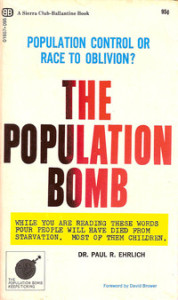 A colleague, Skylar Kahn, once met Isaac Asimov and subsequently wrote an interesting rememberance of one his speeches from the 1970’s (www.copperarea.com/pages/isaac-asimov-womans-role/). The theme of population growth concerns me and inhabits my latest sci-fi novel in progress.
A colleague, Skylar Kahn, once met Isaac Asimov and subsequently wrote an interesting rememberance of one his speeches from the 1970’s (www.copperarea.com/pages/isaac-asimov-womans-role/). The theme of population growth concerns me and inhabits my latest sci-fi novel in progress.
In his concern about overpopulation, Asimov echoed the popular intellectual concern raised by Paul Erlichman’s best-selling 1968 book, The Population Bomb, a Malthusian alert.
Much of the panic around population growth has eased as the “green revolution” and other technological advances demonstrated that we can feed 8 billion people. But it’s a false complacency, since we are now up against the carrying capacity of the planet, which no amount of seed engineering can overcome.
Is the solution to channel the population to other planets and moons? That is the vision of some, such as Elon Musk and Jeff Bezos. But as a timing exercise it doesn’t quite clock out. We are many decades, or centuries away from sustainable migration to other worlds, while the demise of the one we live on seems rather imminent.
Is it feasible, as Asimov suggested, to voluntarily reduce population growth? That seems unlikely also. The reproduction rate does drop with increasing affluence and education, especially education of women, but globally, the expansion of education does not look sufficient to keep pace, especially in Africa, Asia, and Latin America. We will run out of time (and space, and water, etc.) long before any significant voluntary reduction.
What about war and disease, the “natural” population controls mentioned by Asimov, and Erlichman? One hates to place one’s hopes on apocalyptic visions, but probability is on its side. Control of malaria, AIDS, tuberculosis, cholera, and other population decimators works against pandemics, but only the wit of diplomats holds war at bay. When climate change makes shortages of food and water bite even the rich, it could be “everyone against everyone,” as Thomas Hobbes said.
The devastation of war would synergize the effects of climate change and the combination would definitely get the job done, resetting the engine of population growth.
However, that situation may not be recoverable. Earlier population devastators, such as the European plague, wiped out a third of the people but that was only a pause in ineluctable growth. It might have even been beneficial, disrupting the feudal system of labor allocation to make space for capitalism.
This time around, it is difficult to see how a combination of climate change and war would be other than an unstoppable race to oblivion. With the loss of technocratic civilization, cockroaches and lizards would fare well, but human populations might never recover.
Of course older people always foretell the end of the world. Perhaps we lack imagination. Certainly we lack the naïve optimism of youth that gets impossible things done. Perhaps the best hope is today’s youth. C’mon people: do something!
